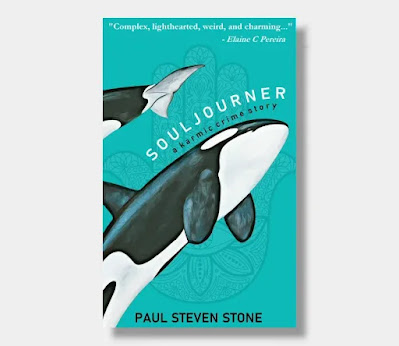
Consummately Plenty and More in SOULJOURNER, the new ‘Karmic crime’ novel
by Paul Steven Stone
article by Michael T. Steffen, Correspondent for Off the Shelf
Tucked in with a good deal of intimations of immortality, in a suggestively boundless discourse on Eastern philosophy, underscored by a belief in reincarnation, with many references to the teachings of Bapucharya, the actual narrative of Paul Steven Stone’s new novel, SOULJOURNER (ISBN: 978-1-912526-4-9, Fahrenheit Press) by contrast beds the loftiness of the protagonist David Rockwood Worthington’s consciousness in the halting mundanity of his current life circumstances, serving a life sentence in a federal prison, haunted by the memories of three failed marriages—the last by murder, hence the prison.
The scope of the novel, in these terms, between the summits of cosmic wisdom and the abysses of human betrayal and depravity, brings up comparison with literary greats like Dante. Not that Stone would lay claims to such an aspiration, nor would the lack of a clearly intentional design in the novel. Importantly, nevertheless, SOULJOURNER does propose and relate a powerful belief in the stakes and eternity of our spiritual lives, with the twist, heralded by the book’s epigraph from Pierre Teilhard de Chardin—
We are not human beings on a spiritual journey. We are spiritual beings
on a human journey.
In a sense, it’s not the discerning fortitude of the protagonist that sugars David Worthington to the reader’s taste, but his vulnerability, which we in our times uphold as definitively human, in the long vein of the modern and post-modern antihero. It has the psychological leverage of turning the same criminal-heads-side coin to its tails-side of victim, with the incidents of Worthington’s unstable mental state due to blackouts ensuing the death of his daughter, Maggie, from his first marriage, to the dazed recollection of being himself strangled in bed by Anna, his third wife, and so acting in self-defense strangling her.
Along with the labyrinthine narrative threads are woven psychic pressures from the “other world” by David’s rather sensible if bothersome alter-ego, Sam the Muse, and from the diabolical Karma of his deceased second wife Roza Rostova. Add in numerous bizarre occurrences, including an out-of-body experience in an elevator, an in-prison IRS audit, visits with an endeared prison physical therapist, an inimical prison psychologist (who inserts session notes into and is ultimately responsible for curating Worthington’s narrative after having the prisoner’s pc taken away), and we have everything and more, including stashed fortunes and dustings of political and geopolitical furniture, to keep the highly versatile Internet-age reader busy. That, “busy,” with “wide-ranging” and “unpredictable” characterize the novel and set it on those edges likely to lose or keep readers, between credence and curiosity.
The great virtues of SOULJOURNER lay in how Stone manages the complexity of his enterprise sentence by sentence simply with deft and vivid writing, as in the description of Roza’s ridicule: “the cackle would always shrink and wither behind her fingers into a shrill hyena’s laugh that would quickly vaporize.” (p.28)
The author is able, moreover, as already pointed out, to reveal the higher inner spheres of the sensitive reader’s consideration. Stone sets forth didactic intentions, a classical primary function of writing which has been largely eschewed and difficult to approach plausibly in “creative” fiction since perhaps Dickens. The author’s self-proclaimed nonce one-sentence first chapter hints at this didactic intention, conferring the enlightening labor to the reader, as a reader of one’s own life in the semiotics of a former existence:
CHAPTER ONE
This is a warning from the previous incarnation of your soul.
It must be said there is an equal effort on behalf of the author to entertain us as we go along, from glimpses of the ordinary, sharing a bucket of chicken wings, to awakening sensible insights: “the power of intention has surprising potential to shape reality.” (p.77) This is no small pronouncement in our age of vast communications—intentions—with their scarce, tip-of-the-iceberg “reality” which we lack and so dread and crave. That is, we are prone to the credulity of our easily expressed intentions.
Far from standing us on firm psychological ground, SOULJOURNER invites us to the difficulty of acceptance in realms high and low at the brink of our considerations, to both expel and manifest our deepest fears, those beyond our control, residing in higher powers and our own strained and reactive subconscious. At the same time, toeing down to earth, in the disappointing carnality of lovers and lawyers and mobsters, the novel stiff-arms any pretention at riding one’s ideals beyond the time’s determinations and data. It has aptly been described as “light-hearted, weird and charming” in its complexity, and proves consummately to fulfill a good book’s task of keeping the pages turning in its reader’s hands.
****** author Paul Steven Stone is a member of the Somerville Bagel Bards
